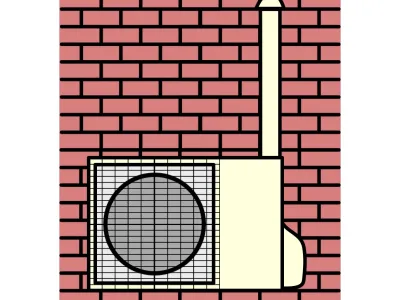Air source heat pumps, what are they? And how do I know if one is right for me?

Updated March 30, 2021
Here at CUB, we work to provide consumers with reliable information on the latest energy saving technology, so you can make informed decisions related to your energy use. This blog post will inform you on the basics of heat pump technology, and direct you to reliable resources to learn more.
What is a air source heat pump?
A heat pump is a way to heat and cool your home. What makes a heat pump different from other kinds of heating and cooling, like central air conditioning or forced air heating, is that they provide both heating and cooling. Heat pumps work like refrigerators. The pumps use coils to move heat between different sources. The Department of Energy states that “because [heat pumps] move heat rather than generate heat, heat pumps can provide equivalent space conditioning at as little as one quarter of the cost of operating conventional heating or cooling appliances.” This means heat pumps can be a cost-effective way to control the temperature of your home.
There are various types of heat pumps for heating and cooling buildings. We focus mainly on air source heat pumps because they are normally the most feasible option for homes and small buildings. Air source heat pumps are powered by electricity, and they’re available for homes that have ducts for central air and heating, or in ductless versions. Geothermal (or ground source) heat pumps can also be an option, more often for larger buildings, and heat pumps can even be driven by a heat source like natural gas. The US Department of Energy Heat Pump Systems guide provides a wealth of information about the various options.
Heat pump technology isn’t new. Air source heat pumps have been used in milder climates for years. However, due to advancements in technology, heat pumps have recently become a viable option for cold weather climates like Minnesota. The Minnesota Center for Energy and Environment recently conducted a project and found that they can provide heating even down to negative thirteen degrees.
The up front cost of buying and installing a heat pump is higher than a traditional HVAC unit, but it can pay for itself in energy savings in many homes.
Here are some questions and considerations to keep in mind while considering a heat pump.
- Since you live in Minnesota, you will need an alternative heat source. No heat pump available today can keep your house warm when it’s 40 below. Heat pumps can be integrated with another heating system, such as a natural gas or propane furnace so that the backup will automatically come on when it’s needed. If you’re considering a heat pump, you can talk with an HVAC installer to make sure that it can integrate with your existing heating system.
- Like any heating or cooling system, the efficiency and ability of your heat pump to control the temperature will vary based on factors, like the build of your home. The more insulated and more energy efficient your home is, the more effective your heat pump will be.
- Your potential savings will also change depending on what your alternative heat source is and the price of electricity. For example, heat pumps have been shown to be cost effective for homes that heat with electric resistance heat. The Minnesota Energy Efficiency Potential study found that “an efficient air source heat pump serving heating loads for an entire single-family home can save over 9,000 kWh, or roughly $1,000, per year in heating costs versus heating with electric heat.” According to the Cold Climate Air Source Heat Pump report, air source heat pumps are often cost effective for homes that currently heat with propane or electric resistance heaters. Natural gas is relatively inexpensive today, so if you heat your home with gas, it may not be cost effective to install a heat pump.
More resources:
- Information and resources for evaluating and installing a ground source heat pump from the Minnesota Department of Commerce. This includes an installation checklist, contractor directory, and more.
- The United States Department of Energy’s general information on heat pumps.
If you ever have any questions about electric heat, electricity rates, or any other concerns relating to your ability to access reliable, affordable energy to heat your home, please contact us here at CUB at info@cubminnesota.org or call us at 651-300-4701.